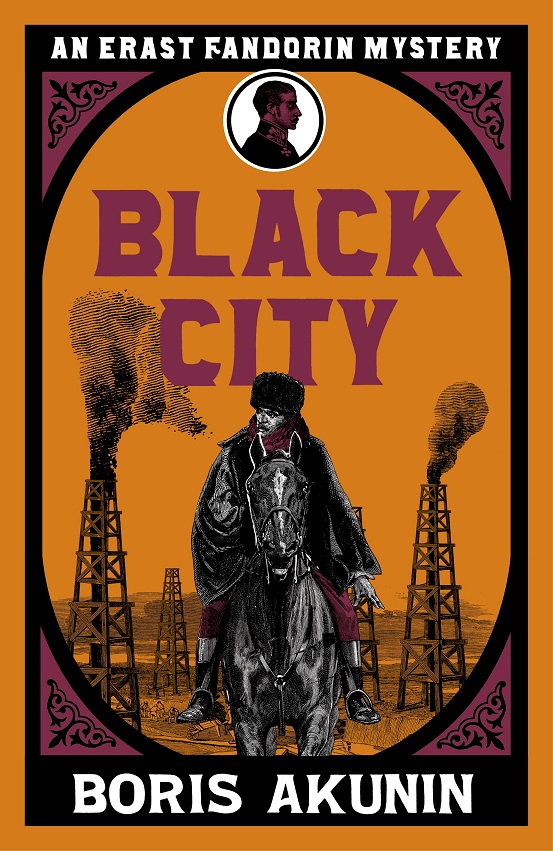It is 1914 – a fateful year for assassinations, war and revolution. The fictional Erast Petrovich Fandorin, the protagonist of Boris Akunin’s series of historical thrillers, is an elegant, eccentric sometime government servant, spy and diplomat, as well as engineer, independent detective and free spirit. He is a completely assured personality, who nevertheless stammers in ordinary conversation. And he is very fond of risk.
This well-travelled Muscovite is visiting Yalta to pay homage to the memory of his hero, Chekhov, thus already utilising the mix of real history and fiction that is characteristic of Akunin’s novels, which play with several genres simultaneously. This means, of course, that the reader cannot necessarily untangle fact and imagination, as the multilingual Fandorin and his Japanese manservant Masa, once a gangster, weave their way through what confronts them. Fandorin keeps a daily aphoristic diary, while Masa trains his master in useful physical skills, including the ability to move silently.
 The stage is set. In Yalta, Fandorin is unexpectedly set up to unknowingly facilitate the assassination of the Tsar’s security chief, Spiridonov. In one of those masculine issues around honour, Fandorin is in his own eyes almost mortally insulted by the plot’s instigator, a mysterious terrorist whose pseudonym is Odysseus. An ultimate confrontation looms...
The stage is set. In Yalta, Fandorin is unexpectedly set up to unknowingly facilitate the assassination of the Tsar’s security chief, Spiridonov. In one of those masculine issues around honour, Fandorin is in his own eyes almost mortally insulted by the plot’s instigator, a mysterious terrorist whose pseudonym is Odysseus. An ultimate confrontation looms...
On the flimsiest of clues, our irritated super-sleuth sets off on the trail of his mischievous rival. Fandorin ploughs on, trainwards, to Baku, on the Caspian Sea; the newly rich and vastly corrupt Russian oil city is responsible for a huge proportion of the world’s output of the indispensable fossil fuel. There he is saved only by some nifty feinting from being casually murdered on the arrival platform.
There are continual flashes of the unexpected: Masa has never seen observant Muslim women before, and takes their yashmaks to indicate that they are deliberately covering up their ugliness. It transpires that Fandorin’s common-law wife, Clara Moonlight, whom he amusingly despises, is also in Baku, starring in a movie, The Love of the Caliph; descriptions of early filmmaking are as much a part of this overwhelming patchwork of a novel as are early cars – Daimlers figure especially – as well as the horrors of the early oil industry, including seas on fire. Meanwhile Sarajevo impinges, and Fandorin, ignorant of that conflagration to come, assumes that the Europeans will smooth everything over.
In a brilliant, terrifying interplay of capitalist greed and competition in overt and covert warfare between those who own the means of production and those who can organise politically orchestrated strikes, the real spectre of political revolution is obscured by distractions. As bullets fly from Mausers and other well described weaponry, the faithful Masa is badly wounded. Armenians are the villains to the unlikely allies and conspirators who are in a loose network infiltrated by Fandorin. He is the target of at least three assassination attempts and an early horrible incident has him, bound hand and foot, thrown into an oil well to drown in the stuff. A very clever thug, Hasim, becomes, inexplicably, a major ally, a comrade in arms – and there are plenty of arms. As in a Jacobean tragedy, the reader might be helped by a cast listing as the narrative reels between Eastern and Western cultures that mix and match in the oil-fuelled conspiracies and rivalries of Baku.
Nothing is as it seems, and the dynamics of the novel involve Fandorin figuring out the pattern in a shifting kaleidoscope. Names change for the same person, in keeping with patronymics, nicknames, disguises. Interleaved are detailed and evocative descriptions of desolate landscapes and an extraordinary and fantastically rich city, with ugliness and grandeur intermingled. There is a very grand winter casino, an equally grand summer casino, grand hotels, palaces, and horrific neighbourhoods and hideous industry, all meticulously and atmospherically described. A Persian eunuch, Zafar, and a German tutor are involved in the household of a female Muslim oil entrepreneur, Madam Saadat Validbekova, the widow of an ancient oil millionaire, whose emotional life is allied to her young son Tural who – natch – is kidnapped. Not by the Bolsheviks but as part of a commercial war, her enemy a plutocrat called, perhaps, Artashshov.
The seemingly politically motivated strike will cripple oil production; he who controls the strike, will control oil, and whoever that is will be the most powerful person in the Russian Empire. You may have trouble keeping track… In the midst of all the complex mayhem, occasional brutality and an increasing body count, realpolitik flickers in and out; this is a novel to sharpen the wits. Fandorin is 58, and has spent, he tells us, 40 years killing: now the leaders from St Petersburg come to Baku to ask him to go to Vienna and stop the coming war; the revolutionaries are more prescient about the coming carnage and what it means for their cause. Happy endings – what those might constitute is not at all certain – are not in the least assured, but the journey is amazing.
- Black City by Boris Akunin, translated by Andrew Bromfield (Weidenfeld & Nicolson £20, Kindle edition £9.99)
- Read more book reviews on theartsdesk















Add comment